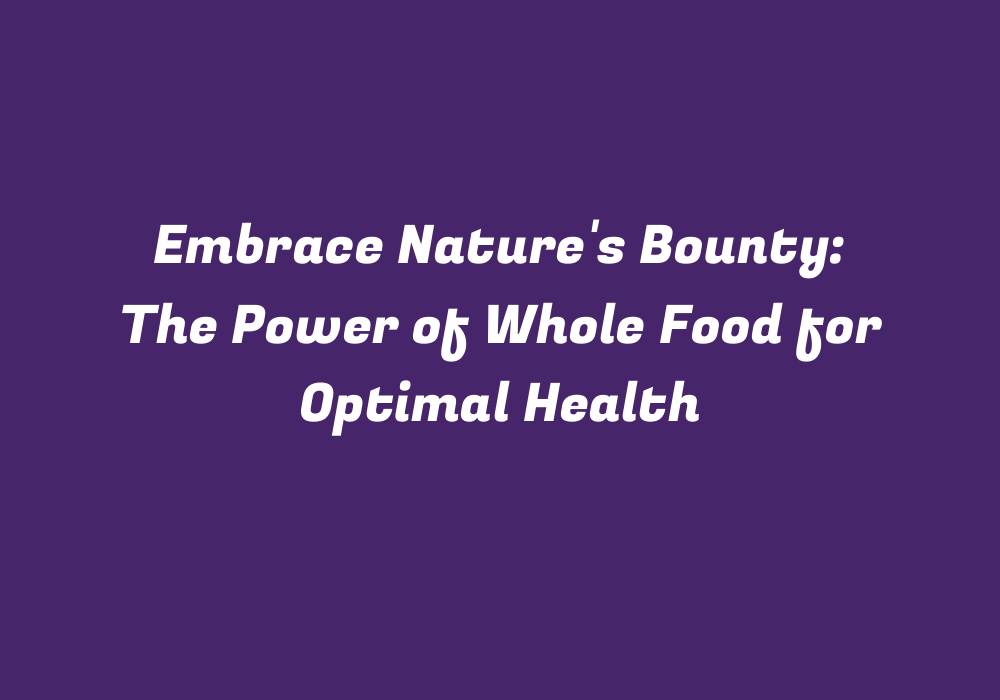Introduction to Whole Foods for Optimal Health
In today’s fast-paced world, it is essential to prioritize our wellbeing. The food choices we make play a significant role in determining our overall health. Embracing nature’s bounty through the consumption of whole foods is one way to ensure an optimal lifestyle. These are unprocessed, nutritious items that provide numerous benefits for your mind and body.
Understanding Whole Foods
Whole foods refer to fruits, vegetables, nuts, seeds, legumes, grains, dairy products, and animal proteins that have been minimally processed. These foods are rich in vitamins, minerals, antioxidants, fiber, healthy fats, and protein. They can be found in their natural state or with minimal processing to retain their nutritional value.
Benefits of Whole Food Consumption
Improved Nutrient Intake
A diet rich in whole foods provides a wide range of essential nutrients that are vital for our body to function properly. These include vitamins, minerals, fiber, healthy fats, and phytonutrients. By consuming the necessary nutrients from whole foods, we can prevent nutritional deficiencies and ensure optimal health.
Enhanced Gut Health
Fiber is an essential component of a whole-food diet, as it contributes to the growth of beneficial bacteria in our gut. A healthy microbiome supports digestion and boosts immunity. By incorporating whole foods into your diet, you can improve gut health while promoting overall wellbeing.
Stabilized Blood Sugar Levels
Whole foods contain complex carbohydrates that are released slowly into the bloodstream. This helps maintain stable blood sugar levels and reduces the risk of developing type 2 diabetes or other related conditions. Moreover, whole-food diets typically provide a balance of carbohydrates, fats, and proteins for sustained energy throughout the day.
Healthy Weight Management
Research has shown that people who consume whole foods tend to have better weight management compared to those who rely on processed foods. The high fiber content in whole foods helps promote satiety, reducing the likelihood of overeating and snacking on unhealthy options. Additionally, a balanced diet rich in whole foods ensures essential nutrient intake while minimizing excess caloric intake.
Reduced Risk of Chronic Diseases
Numerous studies have linked a diet high in whole foods to a lower risk of chronic diseases like heart disease, stroke, cancer, and diabetes. The antioxidants present in fruits and vegetables may help protect the body against oxidative stress, while healthy fats contribute to maintaining proper cardiovascular function. By focusing on whole food consumption, you can significantly improve your overall health and wellbeing.
Incorporating Whole Foods into Your Diet
Plan Your Meals in Advance
Preparing a weekly meal plan helps you ensure that you’re incorporating a variety of whole foods into your diet. This allows for more thoughtful choices and minimizes the likelihood of relying on processed convenience meals.
Shop at Farmers Markets
Visiting farmers markets not only provides access to fresh produce, but also supports local farmers. You can purchase whole foods in their peak season and at an affordable price. Engaging with the community and supporting local agriculture is another aspect of embracing nature’s bounty.
Stock up on Pantry Staples
Keep your pantry stocked with whole grains, legumes, nuts, seeds, and other staple items. This will make it easy to incorporate them into your meals without having to rely on processed alternatives. Remember to avoid buying pre-packaged snacks that may contain hidden ingredients or excessive amounts of added sugar.
Educate Yourself About Whole Foods
Learning about the benefits of specific whole foods and their nutritional profiles can help you make better choices. Researching recipes that incorporate a variety of whole foods will ensure that your meals are both tasty and beneficial to your health.
Conclusion
Embracing nature’s bounty through the consumption of whole foods offers numerous benefits for our overall wellbeing. From improved nutrient intake to enhanced gut health, stabilized blood sugar levels, weight management, and reduced risk of chronic diseases, a whole-food diet is essential for optimal health. By incorporating these foods into your daily life and making mindful choices, you can create a positive impact on your wellbeing while connecting with the natural world around you.
Frequently Asked Questions
What are some examples of whole foods?
Examples of whole foods include fruits, vegetables, nuts, seeds, legumes, grains, dairy products (if non-vegetarian), and animal proteins. These items can be found in their natural state or with minimal processing to retain their nutritional value.
How does consuming whole foods impact gut health?
Whole foods contain fiber, which is essential for maintaining a healthy microbiome and promoting digestion. A balanced gut microbiome supports overall wellbeing, including immunity and the prevention of chronic diseases.
Do whole foods provide any benefit to weight management?
Yes, studies have shown that individuals who consume whole foods tend to have better weight management compared to those consuming processed foods. The high fiber content in whole foods helps promote satiety, reducing the likelihood of overeating or snacking on unhealthy options.
How do whole foods impact chronic disease prevention?
A diet rich in whole foods has been linked to a reduced risk of chronic diseases like heart disease, stroke, cancer, and diabetes. The antioxidants found in fruits and vegetables may protect against oxidative stress, while healthy fats contribute to maintaining proper cardiovascular function.
What are some ways to incorporate more whole foods into my daily diet?
Plan your meals in advance to ensure you include a variety of whole foods. Shop at farmers markets for fresh produce and support local agriculture. Stock up on pantry staples, learn about the benefits of specific whole foods, and research recipes that incorporate them into delicious, nourishing dishes.
Are there any drawbacks to consuming a diet based solely on whole foods?
While whole foods provide numerous health benefits, it is important to be mindful of balancing nutrient intake and maintaining a well-rounded diet. Consult with a healthcare professional for personalized guidance, especially if you have specific medical conditions or concerns.
